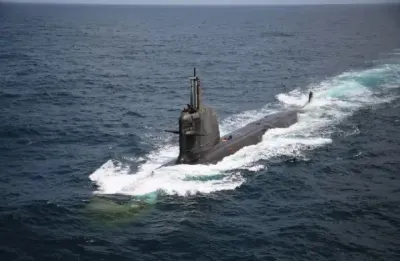Do Australians Trust That AUKUS Will Deliver Submarines?

Synopsis
Key Takeaways
- 60% of Australians doubt delivery of submarines under AUKUS.
- Only 6% believe it's 'very likely' to happen.
- The Geelong Treaty establishes long-term defense cooperation.
- Public trust in international partnerships is declining.
- Concerns about Australia's national security are rising.
Canberra, July 30 (NationPress) A significant portion of Australians express skepticism regarding the likelihood of acquiring nuclear-powered submarines under the AUKUS security pact, according to a recent survey.
The poll, conducted by the independent research organization Essential Research as part of their regular assessments on Australian matters, revealed that 60% of participants believe it is either "not that likely" or "not likely at all" that the US will fulfill its promise to deliver submarines to Australia under AUKUS.
Only 6% of the respondents indicated that they find it "very likely" that the AUKUS agreement will result in Australia receiving nuclear-powered submarines, while 34% considered it "quite likely," as reported by the Xinhua news agency.
A majority of individuals, across all demographics, conveyed doubts about receiving the submarines. Among those aged 55 and older, the skepticism was even higher, with 65% indicating that they believe delivery is "not that likely" or "not likely at all."
When asked about Australia's diplomatic ties with other nations, only 40% rated its relationship with the US as "positive," a decline from 65% in November 2023.
On July 26, Australia and the UK formalized a 50-year agreement regarding the AUKUS defense treaty, despite the ongoing review of the pact by the United States.
Australia's Deputy Prime Minister and Minister of Defence, Richard Marles, alongside UK Defence Secretary John Healey, endorsed the bilateral Nuclear-Powered Submarine Partnership and Collaboration Treaty, also known as the Geelong Treaty, during their meeting in Geelong, Victoria.
Marles and Healey described the Geelong Treaty as a historic accord, ensuring 50 years of UK-Australian bilateral defense collaboration under AUKUS Pillar I in their joint statement.
The Geelong Treaty aims to facilitate extensive cooperation in the design, construction, operation, maintenance, and decommissioning of the SSN-AUKUS submarines. This agreement will also aid in developing the necessary personnel, workforce, infrastructure, and regulatory frameworks for Australia's SSN-AUKUS program, while supporting port visits and the rotational presence of a UK Astute-class submarine at HMAS Stirling under the Submarine Rotational Force-West.









